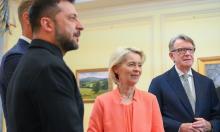Sudan loses bid to lead African Union from genocide
African leaders handed the African Union presidency to the Republic of Congo Tuesday, officials said, after Sudan's bid to lead the 53-nation bloc failed due to concerns over allegations it sponsored genocide in its western Darfur region. Sudanese Foreign Ministry spokesman Jamal Mohamed Ibrahim told a news conference that as a compromise his country would assume the rotating one-year presidency in 2007.
"It is a winner. Sudan is not losing," Ibrahim said afterward. Republic of Congo's President Denis Sassou Nguesso, who like Sudanese President Omar el-Bashir seized power in a coup, was installed as AU chairman on Tuesday, his spokesman said.
"President Sassou has been elected by consensus," Sassou's spokesman Firmin Ayessa said. The previous chairman, Nigeria's President Olusegun Obasanjo, will remain in charge of mediating the Darfur conflict, he added.
Burkina Faso President Blaise Compaore said other AU members would work with el-Bashir to help prepare him to become the AU chairman, in comments that suggested lingering reservations. "We hope that between now and next year we will be able to help him assume responsibilities and in the resolution of crises which will allow Sudan to take up the chairmanship," Compaore said. Other delegates said Sudan still had to meet certain conditions before it could lead the AU, but gave no details. Deep concerns emerged that Sudan's human rights record could damage the African Union's credibility. The organization has carved itself a crucial role in mediating crises, such as the Darfur conflict where the Sudanese government is accused of using the Janjaweed militia to unleash a campaign of murder, rape, arson and looting to stamp out a rebellion.
The conflict has spilled over into neighboring Chad, which along with Uganda and Eritrea accuses Khartoum of arming and supporting rebels fighting their governments. Sudan denies those charges. "If Sudan's record of atrocities makes it unsuitable to lead Africa this year, it's hard to see how el-Bashir will be the best leader to make Africa's case to the world next year," Reed Brody, a special counsel to Human Rights Watch at the conference told the AP.
The decision to defer Sudan's presidency was seen as a sign of progress in the African Union, which was formed four years ago to replace the Organization of African Unity dismissed by many as a dictators' club. The new union promised to work on an African renaissance by promoting human rights, development and democracy. The United States has accused el-Bashir's government of genocide in Darfur, where the United Nations says 180,000 people have died in three years, about 2 million have been forced from their homes.
Sudanese Information Minister Alzahawi Ibrahim Malik denied at a news conference that Darfur was reason why the AU broke with tradition and did hand Sudan, the summit host, the organization's chairmanship. "Sudan is targeted and will continue to be targeted," he said. "The question isn't a question of Darfur but that we are being targeted ... We, as Africans, have to find a solution to our own problems."
A West African delegate said leaders also were concerned that if Sudan got the chairmanship it would not be able to interact with the African Union's development partners, apparently referring to donors including the United States and countries in the European Union. U.S. President George W. Bush expressed concern Monday over the prospect that Sudan would chair the AU, reports the AP. N.U.
Subscribe to Pravda.Ru Telegram channel, Facebook, RSS!




